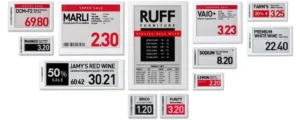According to Sigmaintell, shipment volumes of electronic shelf labels (ESLs) will reach 100 million globally in 2018, with an annual growth rate of 18%.
Electronic shelf labels are usually composed of display modules, control panel and batteries, designed to replace conventional paper labels. They are usually used in the retail industry, in environments such as self-service supermarkets, merchandise stores, drug stores, etc., as well as plants and warehouses. Compared to paper labels, ESLs have higher efficiency, lower error rates and human capital costs, as well as the advantage of fast updates and communicating a lot of data. Therefore, Sigmaintell says they are more suitable for the development of the “new retail” industry.
The requirements for ESL display panels tend to be extremely low power consumption and costs, as well as steady display effects. However, there are four main types of ESL display technology in the current market: segment mode (LCD), bistable LCD, E Ink and total reflection LCD display panels. E Ink and total reflection types are optimal, while bistable state displays show medium functionality and segment mode displays are relatively weak. In terms of cost, segment mode is the lowest, bistable displays are in the middle and e-ink is the best.
There are obvious cost implications for ESLs compared to paper labels, so ESL manufacturers are facing huge cost pressures, according to Sigmaintell. Further breakthroughs lie in new business models. Breaking away from the conventional sales mode for ESL overall units, manufacturers could put the overall units into supermarkets, shopping malls, etc., through leasing and service fee charges. Sigmaintell says the market potential for ESLs is boundless, providing a novel opportunity for the panel industry, especially a-Si panel-makers.
Analyst Comment
One of the big factors that Sigmaintell didn’t mention is legislation. In some European countries, wrong price labelling can cause retailers to be fined significant amounts by trading standards authorities. Retailers are also going increasingly multi-channel and may have to react to fast changes in online pricing, which may then need to be immediately reflected in store. (BR)

